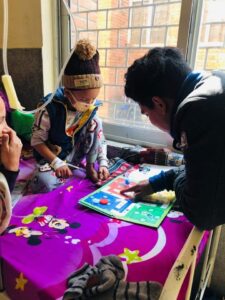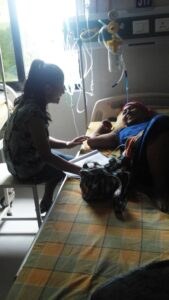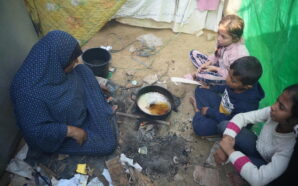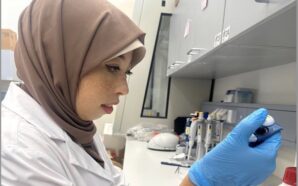As I was exploring DCF’s work, I lost thought for a few minutes when I read these lines on its Homepage, “In Nepal, cancer is still considered a communicable disease and cancer patients are ignored in the society.”
I could not help thinking how heartbreaking it must be for someone to be diagnosed with cancer and face discrimination in a new way. All while struggling with financial limitations, lack of healthcare facilities, and depression. But to feel heartbroken and do something for the well-being of people suffering are two different things. And this is where Terisa Tamang and Dhairya Cancer Foundation (DCF) step up. Based in Kathmandu, Nepal, the main objective of Dhairya Cancer Foundation (DCF) is to educate people and provide practical, emotional, and social support to cancer patients and their families.
Terisa Tamang is the driving force behind this foundation. Ananke’s Nuzhat Nisar Ahmed chats with Terisa, founder and president of Dhairya Cancer Foundation, to discuss her journey.
Let us start from the beginning. Tell us about yourself.
I am Terisa Tamang, a psychosocial counsellor and the founder and president of Dhairya Cancer Foundation. I am deeply committed to the mental health support and well-being of cancer patients and their families.
How did DCF come into being?
Dhairya Cancer Foundation (DCF) is a non-profit nationwide social organisation founded in November 2017. Establishing DCF was not an easy task. My mother called me crazy, but with my vision to establish rehabilitation facilities for cancer patients to provide quality care and life, she supported me unconditionally.
One day, I saw a news report about a teenage boy battling kidney cancer. His emotional letter to his mom states that he is taking his own life because he does not want to be a burden to his family. That news touched my heart. It was a profound moment of inspiration. But I was confused about how I could help. Then, I got an opportunity to go to the UK. During my visit, I came across the Macmillan Cancer Centre and Maggie’s, which provides cancer treatment and mental healthcare to patients. The idea was so new to me. In Nepal, we do not have many counselling centres for cancer patients, and a few we have are not easily accessible. So, after coming back, I went to the Nepal Health Research Council to learn about the mental health statistics of cancer patients. However, no specific data was available, and it was impossible to find out the statistics on cancer patients. So, with a commitment to change this situation, I established DCF.
What is your driving force behind it?
My driving force is the belief that everyone deserves access to mental healthcare support and the opportunity to live a fulfilling life. I am motivated by the desire to break down the stigma surrounding mental health in Nepal and to provide essential emotional support to those facing cancer and mental health challenges.
What is the Cancer Awareness Program, and why do you think people in Nepal need it?
The Cancer Awareness Program conducted by Dhairya Cancer Foundation aims to raise awareness about cancer, promote early detection, and provide psychosocial support to cancer patients and their families. It is required here because of limited access to cancer care and mental health resources. Many people lack awareness about cancer, leading to late-stage diagnoses and increased mortality rates. It is heartbreaking but a reality that seeking help for cancer and mental health treatment is considered a financial burden on the family. DCF’s programs bridge these gaps and empower individuals to take charge of their health.
 It is concerning to know that cancer patients are prematurely dying, and it is one of the most common causes of death in Nepal. What are the contributing factors, and do you think since DCF’s inception, it has brought any change?
It is concerning to know that cancer patients are prematurely dying, and it is one of the most common causes of death in Nepal. What are the contributing factors, and do you think since DCF’s inception, it has brought any change?
There are several factors, such as late-stage diagnosis, lack of awareness, limited access to healthcare, and emotional distress faced by cancer patients.
Since DCF’s inception, we have made significant strides in raising cancer awareness, providing psychosocial support, and reducing the stigma around mental health. In many collaborative efforts with the government hospitals in Nepal, we have provided art therapy for cancer children, peer support programs, and mental health awareness campaigns. These programs have positively impacted thousands of individuals. We have a long way to go, but our efforts have impacted the lives of many cancer patients and their families in Nepal.
What is the age-standardised cancer incidence and mortality rates in Nepal?
In 2017, the age-standardised cancer incidence and mortality rates were 101.8/100,000 and 86.6/100,000 respectively in Nepal.
According to WHO Cancer Nepal 2020 country profile, a total of 26,184 cases were reported and total cancer deaths were 19,413 in 2018.
What are the most common cancers in females and males? How can we reduce its risks?
The most common cancers were breast, lung, cervical, stomach, and oral cavity cancers. For males, lung and stomach cancers are prevalent.
The leading risk factors for cancer are tobacco use, dietary factors, air pollution, drug use, and physical inactivity. Promoting healthy lifestyles is the best prevention. Raising awareness about the risk factors and symptoms to facilitate early diagnosis and treatment and access to quality healthcare, particularly in rural and underserved regions, can reduce the risks substantially.
What are the gender disparities in cancer care?
Deeply embedded patriarchal ideology in Nepal is also evident in cancer care for women. Women diagnosed with cancer have difficulty in receiving appropriate and timely care. They often face delays in cancer diagnosis due to limited access to healthcare services.
Gender discrimination is also common. Due to financial constraints, some parents provide cancer treatment only to sons but not to daughters. Societal positions and lack of financial resources make it challenging for women to seek and receive cancer care. So, to address these disparities, we targeted support and awareness for women battling cancer.
Other than increasing awareness and early detection, what are some of the cancer prevention strategies you think are crucial?
Lifestyle modification. Encouraging healthy lifestyles, including regular physical activity, a balanced diet, and smoking cessation, can significantly reduce cancer risk. Promoting vaccination against cancer-causing infections, such as HPV and hepatitis B. Awareness about environmental factors and expanding cancer screening programs are crucial cancer prevention strategies.
 From mental health dilemmas to social isolation, bringing change is never easy. What is your biggest roadblock so far?
From mental health dilemmas to social isolation, bringing change is never easy. What is your biggest roadblock so far?
The biggest roadblock has been the stigma around mental health in Nepal. Many people misunderstand and stigmatise mental health issues. They fear social isolation, and then it is a reality that we lack accessible professional help. So, it is challenging to encourage open conversations. To address these roadblocks, we have been working tirelessly to raise awareness about mental health, educate the public, and provide psychosocial support to those in need.
Do you think there is a lack of support from the media to raise awareness about cancer and mental health issues in society?
Yes, the media has so much power, but it is not raising awareness about cancer and mental health issues as it should. These topics often remain underrepresented or sensationalised, hindering our efforts to educate people and address cultural taboos.
There are a lot of similarities between Pakistan and Nepal’s social dilemmas about cancer and mental health. And there will be more people from the Global South with whom it will resonate. What do you propose we should do as a global community?
We should work as a global community to share knowledge and strategies for cancer prevention and mental health awareness. It includes sharing successful programs and campaigns, supporting each other in research and treatment, and raising awareness about these challenges on a global scale. By collaborating, we can improve the lives of people not only in Nepal or Pakistan but in the Global South.
This interview has been lightly edited for clarity.











